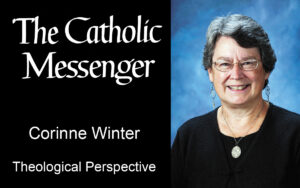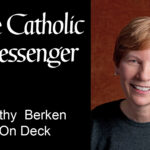By Corinne Winter
Not long ago, I saw a Facebook post comparing “spiritual” people and “religious” ones. The suggestion was that religious people allow the teachings, practices and norms of an institutional church to substitute for engaging in personal spiritual reflection and conscientious decision-making. Part of me was inclined to post a defensive response citing disadvantages I see in the “spiritual but not religious” approach. Those would include lack of the challenge and support found within a community of shared faith and the lack of a consistent faith Tradition upon which to draw, although my dialogue partner would most likely have claimed a greater freedom to draw on the wisdom found in all faiths.
 But my posting such a response, especially in a social media forum, would certainly have been fruitless, merely contributing to the on-going and repetitious exchange of favorite slogans between the two designated “sides” of the discussion. In truth, I believe I should at some level allow myself to be challenged by those who reject organized religion. I need to recognize, first, that many of the rejecters have been let down or hurt by members of a church. By arguing with them, I contribute to the hurt. I need to listen and acknowledge their experience even if it includes interpretations that I believe are erroneous. Pope Francis, through his speeches, encyclicals and examples, calls us to that kind of outreach. He calls us to accompany others on their journeys, offering no condemnation but giving witness by our care and the joy of our own lives to the richness we find within the church.
But my posting such a response, especially in a social media forum, would certainly have been fruitless, merely contributing to the on-going and repetitious exchange of favorite slogans between the two designated “sides” of the discussion. In truth, I believe I should at some level allow myself to be challenged by those who reject organized religion. I need to recognize, first, that many of the rejecters have been let down or hurt by members of a church. By arguing with them, I contribute to the hurt. I need to listen and acknowledge their experience even if it includes interpretations that I believe are erroneous. Pope Francis, through his speeches, encyclicals and examples, calls us to that kind of outreach. He calls us to accompany others on their journeys, offering no condemnation but giving witness by our care and the joy of our own lives to the richness we find within the church.
Hearing those who reject religion can also challenge me to attend to the character of my own faith life. As rich as the Catholic Tradition is, it is still possible for me to lapse into a routine practice without devoting the thought and energy it deserves. We are called to be engaged participants in the liturgical, spiritual, credal and moral life. Engagement can take many forms. One need only peruse The Catholic Messenger to see lists of and stories about prayer gatherings, conferences, retreats, classes and actions for social justice. There are books, journals, DVDs and broadcasts of various types. There are national and international organizations I can support in various ways. Obviously, I can’t jump into all of them. I need to choose those that fit my own life of faith, including those that will challenge me to move at least a bit beyond my comfort zone.
Making the choice calls for careful reflection on my own spiritual journey, reflection that is best pursued in dialogue with others through spiritual direction or spiritual friendship.
Being a spiritual person means being a whole person; it means living in such a way that all aspects of my life, including prayer, church, work, family, friendships and social involvement are integrated, consistent with and supportive of one another. That is a lifelong challenge and it often seems that the world in which we live is driving us in the opposite direction. Family life, commitments to social causes and work compete for our time and devotion. Even the opportunities offered by our church may seem to demand that we carve out another little corner for them.
Kevin Irwin, in “Models of the Eucharist,” asserts that the entire cosmos, including all aspects of our own lives is brought together before and in God’s creative love as we celebrate the Eucharist. He cites, among others, a description found in the “Didache” of the bread as having brought together grains that were “scattered in the hills.” He speaks of the human work represented in the offering of bread and wine. The bishops at the Second Vatican Council described the Eucharist as the sacrament through which we express and achieve union with Christ, “from whom we come, through whom we live, and towards whom we direct our lives (LG 3).” When we leave Mass, we are told to bring the Eucharist into all of life. So the Eucharist calls us to be truly spiritual persons within our religious Tradition. That, of course, requires that we enter prayerfully, thoughtfully, attentively into our eucharistic celebration. We must make our best efforts not to let it become just something we are doing because we always do it or because the church says we must.
(Corinne Winter is a professor-emerita of St. Ambrose University, Davenport.)











